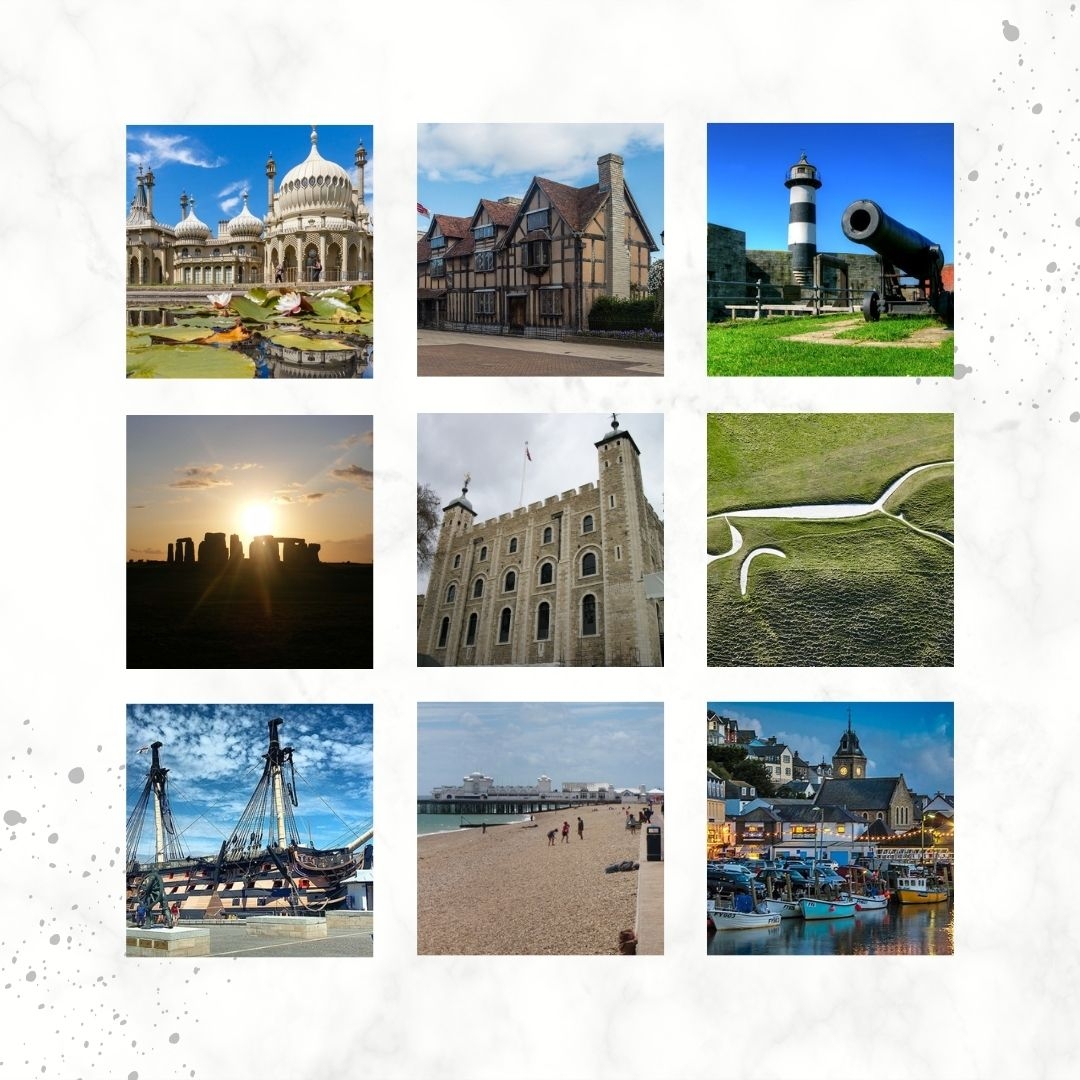Users Who Spiked

CREATIVE WRITING: CHILDHOOD MEMORIES OF ENGLAND
Private Notes
Private Notes
Notes
Picture this: a warm day walking along a seaside promenade, watching the waves of the English Channel move over the softly colored pebbled beach. A seagull catches the updraft and sails over a group of Pearlies that are performing for a handout of change or a few pound notes. The boardwalk is full of laughing, happy children as they climb the steps to the top of a lighthouse, only to slide down the sides on burlap mats, going round and round.
Or how about a green plain, devoid of trees, where a slight hill can be seen topped with a ring of large stones that seem impossible to move. The sun filters through the headstone as a group of white-robed strangers moves around them, chanting in a language long forgotten in this world. There is a chill to the air, due to the dampness of the weather or another force, one cannot be sure, yet it is still there.
An old draw bridge over a winding river. A white-faced castle where beheadings once occurred in its square courtyard. Thatched cottages. White cliffs. A Georgian warship that sailed the Battle of Trafalgar. A pavilion that houses horses instead of an Indian king.
Wax museums. Art museums. Cathedrals, old and new. Rolling hills with chalk horses. Fishing towns with cobblestone streets. Crumbled walls of ancient fortresses. Forests as old as time. A wall that splits the landscape and two countries. A round table that was believed to be the center of a majestic court.
Legends and stories. Myths and truth. History and modernizations mixed together over a country that only spans 50, 351 square miles. A country that gave birth to a new nation at least twice its size.
That country is called England.
To see the rolling hills of this country as a nine-year-old child was, to say the least, a life-altering experience. As soon as one steps off the plane at Heathrow Airport in the heart of London, you can feel the history and age of this majestic land. Whether going to the local school, an American child among the British wearing their uniforms, or traveling the countryside to take in as many attractions as possible, you cannot help but to wonder at the world you have stepped in. A world you would find that is still as vivid in your mind twenty-six years later. A world that permeates your writing, the music you listen to, the television shows you watch.
It is very hard to pinpoint any particular place to start your journey through England. As I have grown into adulthood, many people have asked me 'where do you suggest I visit while I'm in England?' And my answer has always been the same: see as much as you can because you still won't see enough. I do, however, tend to suggest three places that everyone should see while on British soil. Stonehenge. Stratford-Upon-Avon. Portsmouth.
When you first approach the ring of standing stones that stand as ancient sentinels upon the plains of Salisbury, you will stare at them, marveling at the sheer size of the slabs. Arranged in a circle that coordinates with the rising and setting suns during the summer and winter solstices, Stonehenge seems timeless. Its age has been estimated at five-thousand five years old and yet to this day, with all of our marvels of technology, man has still not been able to determine how the stones were moved and placed with the simple tools that were available to it's architects. Were they placed there by aliens? Was Merlin, the wizard associated with the legends and stories of King Arthur, responsible for its construction? Or did early man simply find a way to build the megalithic monument? No one may ever know.
Once, visitors to this mystical attraction were invited to walk among the ring of standing stones. Unfortunately, vandalism has stopped that. Even though tourists are required to walk a path yards from the stones themselves, you can still feel the energies that surround them. Every step along the path gives you a different perspective of the ring of stones. Depending on the time of day, an intrepid person can measure the shadows they cast and gauge the size of each of these massive stones. One cannot walk away from Stonehenge without taking something with them. That something is different for each.
Far from Stonehenge lies a city that gave birth to one of the greatest playwrights and authors of all time, William Shakespeare. Stratford-Upon-Avon is a well-built city that is located along the river Avon. Its streets are narrow compared to the roads of other cities in England and they are lined with Tudor-style houses, with their quaint white stucco sides that are blocked off with deep brown wood. Windows are still paned with wrought iron, giving the dwellings an antiquated look. There are gardens that hide behind the houses that are well tended and colorful when in bloom. And the residents will greet you with a smile.
Nestled in this community are two houses of note. The birthplace of Shakespeare is a surprisingly small dwelling that gives the tourist a taste of life during the Bard's time. Two-storied with a narrow staircase, you get a sense of warmth and a close family that enjoyed the company each other provided in lean times. A tall visitor may be required to duck as they travel through the rooms, rooms that are lit with the soft glow that filters through the windows of glass as old as the home. It was here that he wrote some of his most remarkable masterpieces, such as 'Romeo and Juliet', 'King Lear', and the Scottish play, 'Macbeth'. Not far from this house, in the small hamlet of Shottery, is a large, thatched cottage that once belonged to Anne Hathaway, Shakespeare's wife. Not much is known about their relationship beyond the fact that they had one child and is buried side by side in the Holy Trinity Church in Stratford. Stratford-Upon-Avon is an inspiration to any writer, whether a novice or a professional. You can be sure that the Bard is watching over you as you traverse the streets of his home.
A simple train ride through the beautiful countryside of England will return you to the southern coast and the city of Portsmouth. Built as a naval city, Portsmouth boasts the remains of a fortress, complete with a lighthouse and cannons that sent volleys across the channel to invading ships as it protected the land. It also boasts the long promenade of Southsea. The beaches are covered with smooth stones in pastel colors, and the sounds that drift to you as you walk along enjoying an ice cream come from the amusement park built along the boardwalk that stretches six hundred feet over the beach into the sea. Here, children run and play among the rides and attractions while parents enjoy the taste and texture of fish and chips. Or play a game beneath the pavilion, lining their pockets with change if they are lucky enough to make them drop off the trays nestled within the machines. Mixed with the smell of salt air one can smell curry and the vinegar that soak the paper that wraps around the fish and chips.
Portsmouth is also the home to Admiral Horatio Nelson's ship, the H.M.S. Victory. Restored in 1922 and set in the dry dock at the Historic Naval Yards, the Victory takes one back to the time of large mast fighting vessels. You can almost hear the sea shanties that sailors of old sang as they worked the lines to unfurl the massive sails, the smell of gun powder as the cannons are loaded, the creak of hammocks as men bedded down for the night. The Victory tells the story of Nelson's fight against Napoleon and the hardened life of a sailor at sea. Nestled within the wooden ship are pieces of the past, a glimpse into Nelson's personal life, and the last place he rests his head before passing on into the next life.
There is never enough time to fully enjoy the sights and sounds this ancient land has to offer. A simple cup of tea and McVities biscuits with a local resident is an opportunity to hear stories of the war or to discuss the standings of a favored soccer team. To walk along the chalk hills of the coast to the pub waiting at the top is a chance to view the close communities and rows of houses of the people that make up England. Even a horseback ride on a back road through a ford in the cold rain is an experience that one will never forget.
I know that I haven't. And one day, I will experience them again.





































